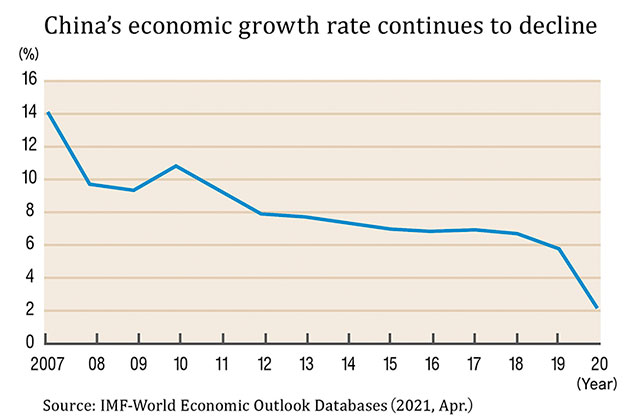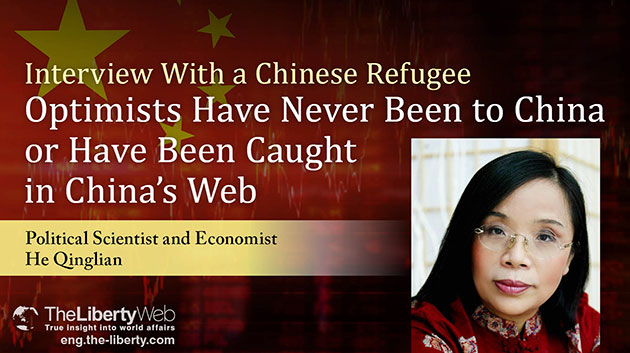Interview With a Chinese Refugee: Optimists Have Never Been to China or Have Been Caught in China’s Web
Political Scientist and Economist
He Qinglian
He Qinglian was born in Hunan, China, in 1956. She obtained a master’s degree in economics from Fudan University in Shanghai. She worked as a journalist at the Shenzhen Legal Daily and was a research fellow at the Chinese Academy of Social Sciences. She continued to uncover structural flaws and corruptions of the Chinese Communist Party’s rule from the perspective of political economy. She fled to the U.S. in 2001. Currently, she’s an active columnist for the Voice of America. Her works include “The Pitfalls of Modernization” and “The Fog of Censorship: Media Control in China.”
――China claims that it has overcome the Covid-19 crisis and that its economy is recovering. Is that a true reflection of China’s reality?
Ms. Qinglian: The situation in China continues to be far from over. Currently, the coronavirus epidemic is very serious in Guangdong province. Especially in Guangzhou, several districts such as Liwan and Nansha districts have been closed off, Medical personnel were dispatched from all over China although the vaccination rate exceeded 66%. The virus is spreading in other provinces, including in northeast China, and China hasn’t contained it.
Covid-19 Bankruptcy, 60 Times That of Japan
Ms. Qinglian: From an economic perspective, China is facing a serious situation. In 2020, more than 460,000 companies, which is about 60 times more than that of Japan, went bankrupt in China. Generally speaking, they weren’t in a state where economic growth could have been expected.
Nonetheless, the Chinese government announced on April 16 that the economic growth rate in the first quarter of 2021 was 18.3%. Of course, official Chinese data has been tampered with, but careful analysis of that data reveals all kinds of things.
This growth metric of 18.3% is based on the ultra-low level of negative 6.8% in the first quarter of the previous year when the number of Covid-19 infections in China exploded, so it doesn’t show that China’s economy has made a great leap forward.
In addition, a major contributor behind China’s growth from a 6.8% decline is a temporary increase in exports. They were able to increase exports by quickly producing medical supplies such as masks and daily necessities while Western countries were struggling with rising infections. However, this is only a temporal increase in exports due to the decline in production capacity in Europe and the U.S. due to Covid-19. It will not last much longer.
――There is also a serious issue of income inequality in China. Do you believe there is room for China’s economic growth by reducing such inequality and improving its distorted economic structure?
Ms. Qinglian: That’s not possible. The upper class and the middle class, which hold the greatest power in today’s Chinese economy, were formed during the era of President Hu Jintao (2002-2012). China joined the World Trade Organization (WTO), and through reforms under former Prime Minister Zhu Rongji, the state fostered state-owned enterprises to monopolize important industries such as energy, telecom and food. Such a foundation supported the decade of the Hu-Wen [Jiabao] administration and established China as ‘the world’s factory.’
But, during the 2009 ‘Lehman shock,’ China made huge investments that included a $5 trillion stimulus package. They were overproducing goods that were excessive for domestic consumption, so they sought an outlet overseas and launched the Belt and Road Initiative. This is when they accelerated overseas investment in infrastructure.
Furthermore, through issuing a large number of Yuan as part of their economic measure, China’s economy became distorted. Economic growth was only achieved due to a rapid increase in real estate investment.

The Chinese Government Always Robs the People of Their Property
Ms. Qinglian: The real problem is not just how many wealthy and middle-class people are in China, but also the rule of law that doesn’t allow private property. The public is not granted the right to basic political participation including freedom of speech, of assembly, of association and of the right to vote. As soon as the Chinese Communist Party (CCP) finds out someone made a critical statement, a police officer will go to their house and threaten them. Under these circumstances, you can’t protect yourself, let alone your property.
The same goes for the wealthy. Under the Xi Jinping administration, Wang Jianlin and Xiao Jianhua, both involved in the Politburo Standing Committee over three generations, Wu Xiaohui, grandson-in-law of late Deng Xiaoping, and even Jack Ma, co-founder of Alibaba Group, have been forced to sell off their assets even if imprisonment were spared.
As a result, China’s investment environment has deteriorated, and foreign capital has gradually pulled off. China’s middle class has sharply declined. The root of the problem won’t be solved as long as the government is a dictatorship that can, at any point, take away the people’s property.
Leveraging Greed: Controlling Businessmen and Politicians
――Some businessmen overseas still believe in the continued growth of China’s economy.
Ms. Qinglian: There are largely two groups of people who think that way. One group is made of people who have never been to China and are caught in the illusion of China’s propaganda that the Chinese market is attractive. When I was in Taiwan, I met many businessowners of this kind, and I think there are many of them in Japan as well.
The other group is made of those who have close relationships with the Chinese government while being aware of China’s reality. This group isn’t limited to businessowners. It also includes the U.S. finance sector and venture capitalists. For example, Biden’s Secretary of State Antony Blinken is one of them. On the homepage of WestExec Advisors, a consulting firm Blinken launched, it mentions that their organization’s strength lies in its positive relation with the Chinese government and its ability to bridge investors.
The CCP is good at taking advantage of human greed and building stakes with businessmen and politicians in each country. They’re good at manipulating them in a way that suits the Party. Once built, these relationships are difficult to break apart.
――What measures should China take to shift from a dictatorship into a democracy?
Ms. Qinglian: Expand the scope of local autonomy. China has vast land with different ethnicities, customs and religions. Even within Han Chinese, characteristics varied by region. For instance, coastal areas such as Hong Kong are opened up and have the capacity to accept Western political ideas. Meanwhile, in Hunan and Jiangxi provinces, Maoism is still prevalent. It’s just not realistic to rule this vast land of plurality in a unified manner.
Local legislation, journalistic freedom and political autonomy should be granted per local circumstances. These steps will further develop the Yangtze River Delta region such as Shanghai and the Peral River Delta region such as Guangzhou. In addition, ministries that rely on the central government’s anti-poverty efforts can become financially independent.



















